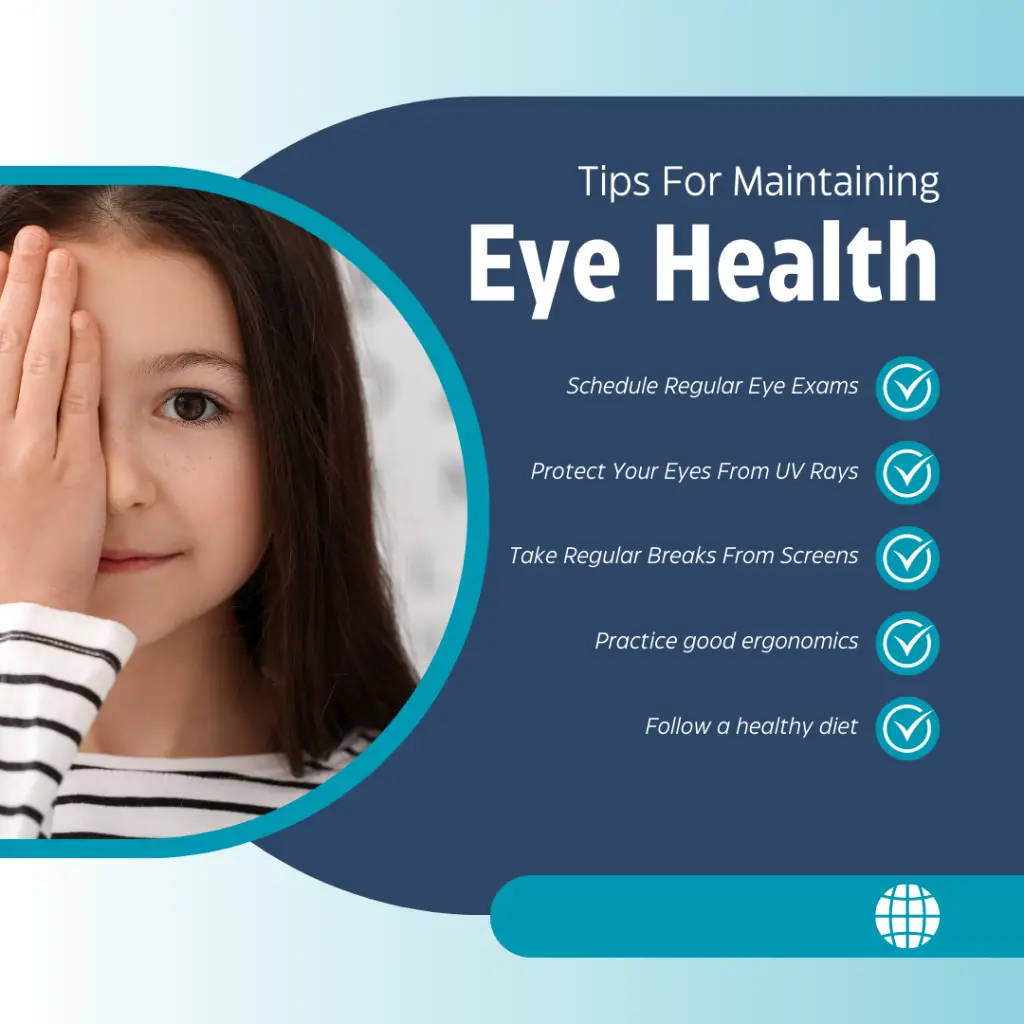Improve Your Eyesight: 11 Simple Biohacks to Try Today
Are you tired of constantly squinting at your computer screen or struggling to read small print? If so, you’re not alone. Poor eyesight is a common problem that affects people of all ages.
Fortunately, there are many simple biohacks you can try today to improve your eyesight and protect your vision.
From adjusting your diet to incorporating regular exercise into your routine, there are numerous ways to give your eyes the nutrients and care they need to function at their best.
In this article, we’ll explore 11 simple biohacks that you can start implementing right away to improve your eyesight and enjoy better overall eye health.
Importance of Maintaining Good Eyesight
Our eyes are one of our most important senses. They allow us to see and experience the world around us.
Good eyesight is essential for many activities, including reading, driving, and watching television.
Poor eyesight can not only be frustrating and inconvenient, but can also lead to accidents and injuries. It’s important to take care of our eyes to maintain good vision and prevent eye diseases such as cataracts, glaucoma, and macular degeneration.

Causes of Poor Eyesight
There are many factors that can contribute to poor eyesight. One of the most common causes is age-related changes in the eye.
As we get older, our eyes become less flexible, making it harder to focus on close objects. Other factors that can affect our vision include genetics, poor nutrition, exposure to UV radiation, and eye strain from digital devices.
- Age-related macular degeneration (AMD)
- Cataracts
- Glaucoma
- Diabetic retinopathy
- Retinal detachment
- Optic neuritis
- Retinitis pigmentosa
- Refractive errors (such as nearsightedness, farsightedness, and astigmatism)
- Amblyopia (lazy eye)
- Strabismus (crossed or misaligned eyes)
- Color blindness
- Eye injuries or trauma
- Inherited eye conditions
- Stroke or other neurological conditions affecting the visual system
- Certain medications or side effects of medications
- Eye infections or inflammation
- Autoimmune diseases affecting the eyes (e.g., uveitis)
- Certain systemic diseases (e.g., hypertension, diabetes)
- Vitamin deficiencies (such as vitamin A deficiency)
- Prolonged exposure to harmful UV rays or radiation
It’s important to note that this list is not exhaustive, and there can be other causes of vision loss as well. If you’re experiencing vision problems, it’s always recommended to consult with an eye care professional for a proper diagnosis and treatment.

Biohacking and How it Can Improve Eyesight
Biohacking refers to the practice of using science and technology to optimize and enhance our physical and mental health.
By adopting certain lifestyle changes and incorporating specific foods and supplements into our diets, we can improve our overall health and well-being. Biohacking can also be used to improve our eyesight and prevent eye diseases.
Diet and Nutrition for Eye Health
One of the most important things we can do to improve our eyesight is to eat a healthy, balanced diet. Foods that are rich in antioxidants, vitamins, and minerals can help to protect our eyes from damage and prevent age-related eye diseases. Some of the best foods for eye health include leafy greens, carrots, sweet potatoes, blueberries, and oily fish such as salmon and tuna. It’s also important to stay hydrated by drinking plenty of water throughout the day.
Limit inflammatory foods such as processed foods, sugar, white flour and soda.

Exercise and Eye Health
Regular exercise can also help to improve our eye health. Engaging in cardiovascular exercise such as running, cycling, or swimming can increase blood flow to the eyes, delivering essential nutrients and oxygen.
Exercise can also help to reduce inflammation in the body, which can contribute to eye diseases such as glaucoma and macular degeneration.
Eye Exercises to Improve Eyesight
In addition to general exercise, there are also specific exercises that can help to improve our eyesight.
These exercises are designed to strengthen the muscles around the eyes and improve focus.
Some examples of eye exercises include palming, which involves covering the eyes with your palms and relaxing for a few minutes, and focusing on distant objects to improve long-distance vision. https://youtu.be/UicwXt3jHvE
Eye Exercises
Blue Light Blocking Glasses and Screens
Excessive exposure to blue light, especially from digital devices such as smartphones, computers, and tablets, has been associated with potential negative effects on vision.
While more research is needed to fully understand the extent of these effects, some studies suggest that prolonged exposure to blue light may contribute to decreased visual performance and eye discomfort.

Eye Drops and Supplements
There are also a variety of eye drops and supplements that can help to improve our eye health. Eye drops can help to lubricate the eyes and reduce dryness, while supplements such as omega-3 fatty acids and vitamin A can help to protect the eyes from damage and prevent age-related eye diseases.
- Omega-3 Fatty Acids: Omega-3 fatty acids, particularly docosahexaenoic acid (DHA) and eicosapentaenoic acid (EPA), are known for their anti-inflammatory properties and are believed to support overall eye health. They are found in fatty fish (such as salmon and tuna), fish oil supplements, and vegetarian sources like flaxseeds and chia seeds.
- Lutein and Zeaxanthin: Lutein and zeaxanthin are antioxidants that are concentrated in the macula of the eye. They help protect the eye tissues from harmful light and oxidative damage. Foods rich in these nutrients include leafy green vegetables (spinach, kale, and broccoli), eggs, and supplements specifically formulated for eye health.
- Vitamin C: Vitamin C is an antioxidant that plays a role in maintaining the health of blood vessels in the eye. It can be found in various fruits and vegetables such as citrus fruits, berries, kiwi, and bell peppers.
- Vitamin E: Vitamin E is another antioxidant that may help protect the cells of the eyes from damage caused by free radicals. Good dietary sources of vitamin E include nuts, seeds, vegetable oils, and green leafy vegetables.
- Zinc: Zinc is a mineral that is important for eye health as it is involved in the metabolism of vitamin A, an essential nutrient for good vision. It can be found in foods like oysters, red meat, poultry, beans, and nuts.
- Bilberry Extract: Bilberry is a fruit rich in antioxidants that has been traditionally used for supporting eye health. Bilberry extract supplements are available and may be beneficial for some individuals.
Proper Sleep and Eye Health
Getting enough sleep is essential for overall health and well-being, including eye health. Lack of sleep can cause eye fatigue, dryness, and redness. It’s important to get at least 7-8 hours of sleep each night and to ensure that your sleep environment is comfortable and free from distractions.br/>br/>
Mindfulness and Eye Health
Practicing mindfulness and relaxation techniques such as meditation, deep breathing, and yoga can also help to improve our eye health. These practices are designed to reduce stress and promote relaxation, which can help to reduce eye strain and improve our overall well-being.br/>br/>
Conclusion and Next Steps
In conclusion, there are many simple biohacks that we can use to improve our eyesight and protect our vision.
By adopting a healthy, balanced diet, incorporating exercise and eye exercises into our routines, using blue light blocking glasses and screens, and practicing mindfulness and relaxation techniques, we can improve our overall eye health and prevent age-related eye diseases.
If you’re experiencing persistent vision problems, it’s important to consult with your eye doctor to determine the underlying cause and develop a personalized treatment plan.br/>br/>
So what are you waiting for? Try incorporating some of these biohacks into your daily routine and enjoy better vision and eye health today!
